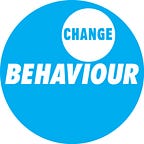Enough of ‘Enough is enough’: women deserve better messaging
Today is International Women’s Day, and no better time for this woman to share a trend that she’s noticed: the use of the phrase ‘enough is enough’ (or close enough) in campaigns about violence against women and girls.
Here’s an example, recently spotted in the wild:
You don’t have to look far to find others: the Home Office ‘Enough’ campaign; plus others from multiple NGOs around the world.
So why has ‘enough is enough’ become a stock phrase in campaigning to describe the efforts to end violence against women and girls?
My best guess is that this wording has felt appropriate in an era where public consciousness of the issue — and outrage about it — has grown. I am outraged. I support every effort to make women safer. But as someone who has spent her career working on campaigns and interventions to create social change, ‘enough is enough’ is a message that worries me.
Firstly, this language implies a lack of severity. You might say ‘enough is enough’ to your children when you’re tired of them squabbling in the car. You might say it to a lazy flatmate who never does the hoovering. You wouldn’t say it to a terrorist, armed robber or kidnapper; that would be silly. So why do we think it’s OK as a message to men who abuse and kill women?
Secondly: we cannot forget that women have consistently been victim-blamed for saying/doing/wearing the wrong things. ‘Enough is enough’ suggests that only now are women standing up for themselves and saying that violent acts against them are intolerable. It only reinforces tired tropes that women are somehow complicit in the crimes that are committed against them. As if we somehow allowed it to happen before. Surely, this is the last thing that we want to convey.
You might be thinking: this is all very well and good, but it’s just a poster.
And to that I would reply: Framing matters. The evidence is very clear: the way you say something affects how people respond. This was initially discovered by the Nobel Prize winners Daniel Kahneman and Amos Tversky, and has been borne out again and again by other researchers across many different issues.
A poster won’t detoxify a misogynist overnight. But effective campaigning can change perceptions, which can put pressure on politicians, who can toughen laws and pump adequate resources into the courts. Or interventions can help shift the social norm, which can change behaviour, which can lead to a stronger and kinder society.
The words we choose matter. The success of a campaign rides on them. And this is literally a life-or-death situation. So, if you are working in this space and want to explore new approaches to tackle the issue, we’d love to talk.
